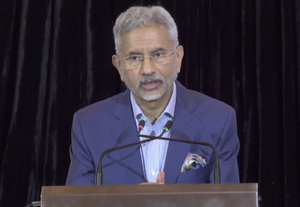New Delhi: External Affairs Minister S Jaishankar Friday asserted that the era of interrupted dialogues with Pakistan is over, noting that “actions have consequences”.
In his remarks at a book launch event in the national capital, Jaishankar said: “Era of uninterrupted dialogues with Pakistan is over. So far as J&K is concerned, Article 370 is done.”
On whether India is content with the relationship with Pakistan to continue as it is, he said, “Maybe yes, maybe no. But what I do want to say is that we are not passive, and that whether events take a positive or negative direction. Either way, we will react.”
During his Singapore visit in March, EAM Jaishankar mentioned Pakistan’s “almost industry-level” sponsoring of terrorism, but stressed “India will not skirt this problem…”
His comments assume significance against the backdrop of Assembly polls in Jammu and Kashmir, where both mainstream regional parties, the National Conference and the People’s Democratic Party, have spoken about resuming dialogue and ties with Pakistan.
Relations between the two neighbouring countries have been tense since August 5, 2019, when India abrogated the Constitution’s Article 370, changing the status of Jammu and Kashmir.
Earlier, Pakistan on Thursday formally confirmed that Prime Minister Narendra Modi has been invited to the upcoming Shanghai Cooperation Organisation (SCO) meeting being held in Islamabad in mid-October.
Last year, Pakistan’s then-Foreign Minister Bilawal Bhutto Zardari visited India for the SCO Foreign Ministers’ meeting.
On the Indo-US ties, Minister Jaishankar said that it’s a valuable relationship.
“The US is today indispensable for our multipolarity to go ahead. Nobody will say we have congruence with the United States. If we actually understand the expectations of the relations. It is not about an alliance and congruence, it is about convergences, overlapping interests, about the ability to work together on issues and areas and theatres which suit us,” he said.
“But there are regions and issues on which we profoundly agree with the US and there are issues on which we do not. It is on full public display,” he said.
IANS
